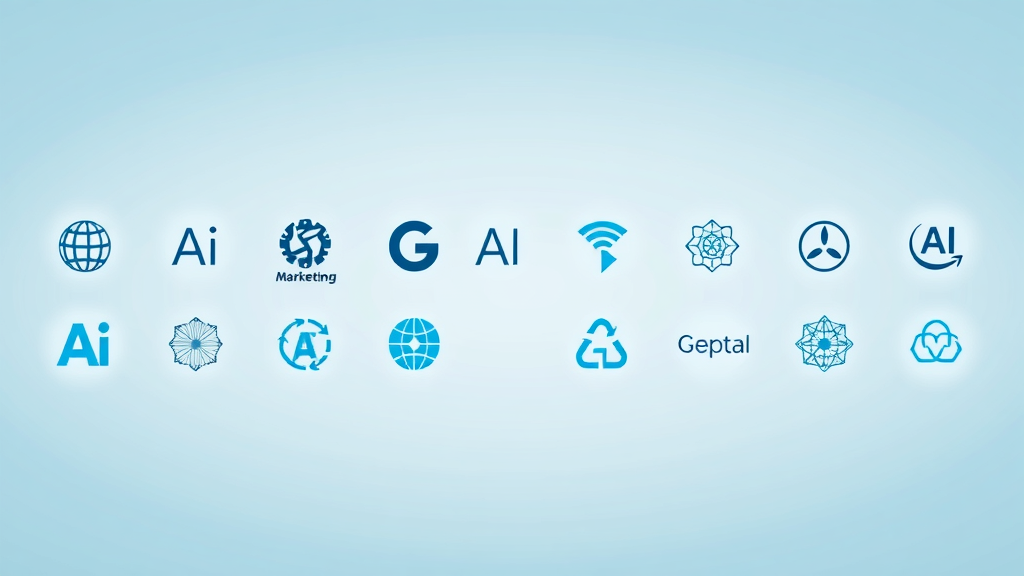Did you know that over 80% of marketing teams are now using artificial intelligence marketing tools to optimize their campaigns? In 2024, AI marketing isn’t just a tech trend—it’s the competitive edge fueling exponential business growth, smarter decision-making, and unmatched campaign success. This guide reveals the best AI marketing tools of the year and exactly how they’re transforming ROI in every channel—from email marketing to content creation—and what actionable strategies you can adopt to future-proof your marketing stack.

Uncover the Power of Artificial Intelligence Marketing Tools: Surprising Statistics & Why Your ROI Depends On It
- Discover why over 80% of marketing teams now deploy artificial intelligence marketing tools for campaign optimization and learn why this edge can mean exponential business growth.
Artificial intelligence marketing tools are now central to the strategies of successful marketing teams. According to leading industry surveys, more than four out of five businesses integrate AI marketing solutions at varying stages of their marketing campaigns. This widespread adoption is not merely for convenience; it stems from significant uplifts in campaign performance, cost reduction, and measurable ROI boosts. With AI, marketers can now mine deeper into customer data, automate repetitive tasks, and personalize content at scale.
What’s driving this swift migration to AI marketing tools? It’s the ability to interpret complex datasets in real-time, allowing brands to act swiftly on customer behavior and feedback. From predictive analytics that forecast upcoming trends, to natural language processing engines enhancing customer support, AI marketing is reshaping how brands connect and engage. Ignoring this technological evolution now could leave your brand incapable of competing with those embracing AI-powered marketing tools. In today’s landscape, maximizing ROI is intimately tied to smart AI adoption.
Elevate Your Strategy: How Artificial Intelligence Marketing Tools Drive Results
- Learn how artificial intelligence marketing tools use customer data, predictive analytics, and sentiment analysis to inform dynamic campaigns and enhance the customer experience.
Artificial intelligence marketing tools aren’t just about automation—they’re about intelligent automation . These powerful AI tools leverage customer data from multiple sources to create unified, actionable insights that marketers can use immediately. By examining search engine trends and analyzing real-time sentiment, AI marketing tools can help brands design dynamic marketing campaigns that resonate with their target audience at every touchpoint.
Predictive analytics is another game-changer in the AI marketing toolkit. With machine learning models, brands can anticipate customer behavior, personalize offers, and optimize spend in both paid and organic channels. Imagine knowing not only what your customers want, but also precisely when they want it—AI marketing tools make this predictive approach a reality. Sentiment analysis, meanwhile, allows marketing teams to keep their finger on the pulse of public opinion, making it possible to adjust a campaign before it misses its mark or leverage trends before they peak.
Incorporating AI marketing tools into your existing stack means reaping the benefits of increased efficiency, informed strategy, and improved customer journeys. Top-performing marketing teams are enhancing their campaigns, reducing manual workloads, and gaining a measurable return by letting AI take on the data-driven heavy lifting. The landscape has shifted—being data smart now means being AI smart.

Top 15 Artificial Intelligence Marketing Tools for 2024 (Ranked & Reviewed)
- Jasper : Superior AI tool for automated content generation and blog post ideation
- HubSpot AI : Comprehensive marketing tool for CRM and email marketing automation
- SurferSEO : AI marketing tool for content creation and search engine rankings
- ChatGPT : Leading ai tool for interactive customer service, copywriting, and chat
- Canva Magic Write : AI tool for social media post creation, design, and branding
- Persado : Data-driven ai marketing platform for email marketing and landing page conversion
- Drift : Conversational AI marketing tool that boosts customer experience and engagement
- Lately AI : Social media scheduling and content generation ai tool
- Phrasee : Optimizes email marketing headlines and ad copy using ai marketing tools
- Hootsuite Insights : Sentiment analysis and social media monitoring marketing tool
- Emarsys : AI-powered email marketing and customer data segmentation
- MarketMuse : Content creation and search engine optimization ai tool
- Seventh Sense : Email marketing ai marketing tool specializing in send-time optimization
- Adext AI : Predictive analytics marketing tool for digital ads
- Salesforce Einstein : All-in-one ai marketing tool for customer data and predictive modeling
Each tool brings unique strengths, leveraging advanced AI—from natural language generation to deep learning analytics—to address every marketing need. Whether you’re focused on content creation, predictive analytics, social media, email marketing, or customer experience, these AI tools provide the backbone for scalable, efficient, and innovative marketing teams in 2024.
For instance, Jasper excels at rapid blog post and ad content generation, saving hours while driving SEO results. Meanwhile, Drift revolutionizes real-time customer service with conversational AI, boosting engagement and conversions. The integration of AI into design tools like Canva Magic Write empowers teams to produce on-brand social media creatives faster than ever before, ensuring every campaign is both timely and visually compelling.
Comparison Table: Artificial Intelligence Marketing Tools Performance & Features
| Tool Name | Use Case | Strengths | Suitable For | Price |
|---|---|---|---|---|
| Jasper | Content Generation | Blog Posts, Ad Copy | Marketing Teams, Agencies | $49/month |
| HubSpot AI | CRM, Email Marketing | Automation, Segmentation | SMBs, Enterprises | Custom |
| SurferSEO | SEO, Content Optimization | SERP Analysis | Bloggers, SEOs | $59/month |
| Canva Magic Write | Visual, Social Media | Design Automation | Social Media Teams | Free/$12.99 |
| ChatGPT | Customer Service, Copywriting | Conversational AI, Natural Language | All Marketers | Free/$20 |
| Persado | Email, Landing Page | Data-driven Messaging | Email Marketers | Custom |
| Drift | Conversational AI | Engagement, Lead Gen | B2B, SaaS | Custom |
| Lately AI | Social Scheduling | Automated Content | Social Teams | Custom |
| Phrasee | Email Copy, Ads | Headline Optimization | Email Marketers | Custom |
| Hootsuite Insights | Social Monitoring | Sentiment Analysis | PR, Social Teams | Custom |
| Emarsys | Email, Data Segmentation | Predictive Analytics | Retail, Ecom | Custom |
| MarketMuse | SEO, Content Creation | Content Optimization | Bloggers, SEOs | From $149 |
| Seventh Sense | Email Timing | Send-Time Optimization | Email Marketers | Custom |
| Adext AI | Analytics, Paid Ads | Predictive Modeling | Ad Managers | Custom |
| Salesforce Einstein | Customer Data, CRM | All-in-One AI | Enterprises | Custom |

Industry Insights: Expert Quotes on AI Marketing Tools Transforming Digital Campaigns
“Artificial intelligence marketing tools now account for over 50% of total marketing technology investments, shaping the way brands communicate and personalize at scale.” – DigitalMarketingInstitute.com
As the digital landscape evolves, AI marketing tools are redefining how brands compete, allocate spend, and engage their audiences. Top experts highlight the irreplaceable role of machine learning in amplifying personalization and accelerating campaign performance across every sector.
From generative AI content to predictive analytics, the transformation fueled by AI extends beyond trend—it’s the new foundation for measurable digital success. Embracing these marketing tools allows companies to keep pace with rapidly changing consumer expectations and outperform competitors who are slower to adapt.
Applications of Artificial Intelligence Marketing Tools for Every Channel
Driving Social Media Engagement with AI Tool Integration
- Automated content generation and scheduling
- Sentiment analysis for trend spotting
- AI-driven customer service chatbots
AI tools like Lately AI and Hootsuite Insights revolutionize social media marketing by automating post scheduling, analyzing social sentiment, and even powering real-time chatbots that engage followers around the clock. By leveraging machine learning, marketing teams can identify content trends, track engagement patterns, and optimize the timing and tone of every post.
Sentiment analysis provides deep insight into what matters most to your target audience, allowing you to adjust messaging on the fly. AI marketing tools also ensure campaigns are consistent and on-brand, reducing the risk of human error and freeing up valuable time for big-picture strategy. The result? Stronger social media campaigns, greater reach, and higher ROI.
Maximizing Email Marketing with Predictive Analytics and AI Tools
- Personalized email sequences
- Send-time and deliverability optimization
- Customer data segmentation for targeted messaging
Email marketing is experiencing a renaissance, thanks to AI-powered marketing tools like HubSpot AI and Seventh Sense. Today, it’s possible to send hyper-personalized sequences, optimize send times for individual recipients, and segment lists on the fly, all made possible by machine learning models trained on vast amounts of customer data and feedback.
These AI tools process millions of data points to identify when a user is most likely to engage, ensuring each campaign reaches the inbox at the optimal moment. Predictive analytics inform subject line personalization and even content generation, making every email feel bespoke. With AI, marketing teams can dramatically improve open rates, click-throughs, and ultimate conversions—directly impacting ROI.

AI Marketing Tools in Content Creation: Enhancing Blog Post and Landing Page Performance
- Generating SEO-optimized articles
- Dynamic landing page copy
- Blog ideas based on search engine trends
In content marketing, generative AI tools like Jasper, MarketMuse, and SurferSEO are transforming how blog posts, landing pages, and even product copy are created, optimized, and published. These tools use machine learning and natural language processing to generate SEO-friendly content tailored to trending search engine topics and audience intent.
By relying on AI for both ideation and execution, marketers can produce higher volumes of content without compromising quality or relevance. These tools also dynamically generate landing page copy that’s tested and optimized for conversions, reducing bounce rates and increasing campaign performance. Marketers who leverage AI tools for content creation report significant time savings, better SERP rankings, and more consistent messaging across campaigns.
Best Use Cases for Artificial Intelligence Marketing Tools: From SMBs to Enterprises
- Streamlining small business marketing workflows using AI marketing tool automations
- Empowering distributed marketing teams with central ai tools
- Enterprise-level customer experience management with predictive analytics marketing tools
Whether you’re a small business looking to automate tedious marketing tasks or a global enterprise seeking to unify distributed teams, AI marketing tools offer a solution. Small businesses often deploy tools like Canva AI and Lately AI to handle social content, email marketing, and data-driven campaigns, all with fewer resources. Automation ensures consistency, frees up time, and maximizes efficiency.
For organizations with multiple teams or regions, centralized AI marketing tools like HubSpot AI and Salesforce Einstein help standardize processes, collect holistic customer data, and enable collaboration. At the enterprise level, predictive analytics engines drive superior customer experience management by anticipating needs, identifying opportunities, and leveraging deep insights for smarter decisions. No matter your business size, the right AI tool elevates marketing efficiency and ROI.

Critical Considerations Before Choosing Your Artificial Intelligence Marketing Tool
- Compatibility with existing marketing tools and platforms
- Data privacy and compliance for customer data
- Scalability for future marketing growth
Selecting the right AI marketing tool means assessing several key factors. First, ensure compatibility with your current marketing stack—integrating seamlessly with your CRM, content management system, and analytics platforms. Data privacy and compliance can’t be overlooked; always verify that the tool aligns with your industry’s security policies, particularly regarding customer data processing.
Lastly, think about scalability. Choose an AI marketing tool that won’t just meet your needs today, but will grow as your campaigns, audiences, and analytics demands evolve. An investment in the right AI tool sets your marketing efforts up for long-term future-proof success.
People Also Ask: Which AI tools are used in marketing?
Answer: Popular artificial intelligence marketing tools include Jasper, HubSpot AI, SurferSEO, Canva’s AI, Drift, Hootsuite Insights, and Salesforce Einstein. These tools span content creation, campaign automation, sentiment analysis, and predictive analytics, helping marketing teams deliver better ROI.

People Also Ask: What can AI be used for in marketing?
Answer: AI can be used in marketing for personalizing email marketing, advancing content creation, automating social media scheduling, monitoring brand sentiment, optimizing paid ads, improving landing page performance, and enhancing the overall customer experience with adaptive campaigns.
People Also Ask: What are the AI marketing agents tools?
Answer: AI marketing agents tools are platforms that leverage machine learning to automate tasks like customer segmentation, lead nurturing, ad targeting, and chatbots, with popular examples being Drift, Intercom, and Freshchat.

People Also Ask: What are the 4 types of AI tools?
Answer: The four core types of AI tools used in marketing include content generation AI (e.g., Jasper), conversational AI (e.g., ChatGPT), predictive analytics AI (e.g., Adext AI), and customer data segmentation AI (e.g., Salesforce Einstein).
How to Integrate Artificial Intelligence Marketing Tools with Your Existing Marketing Stack
- Checklist for integrating top ai marketing tools into CRM, social media, search engine, and email marketing platforms
- Overcoming common integration hurdles
- Ensuring data flow and campaign synchronization
A successful AI marketing integration starts with a clear roadmap. Begin by auditing your existing marketing stack—CRMs, email platforms, content management systems, and social scheduling tools. Choose AI tools that offer native integrations or robust API support for seamless data flow. Pay attention to authentication protocols and customer data mapping, as misalignment here can disrupt insight accuracy.
Common hurdles, such as differences in data format or incompatible software, can be resolved by choosing AI platforms with strong technical support and a proven track record of enterprise integration. Prioritize data synchronization by scheduling regular audits and setting up automatic alerts for integration failures. With the right prep and tools, bringing AI into your marketing ecosystem won’t just be painless—it’ll be transformative.
Boosting Social Media and Email Marketing ROI Using AI Marketing Tools
- Case studies of social media campaigns supercharged by ai marketing tools
- Email marketing performance enhancements driven by AI-powered marketing tools
- Leveraging sentiment analysis to guide real-time campaign pivots
AI has been a catalyst for exceptional results in both social media and email marketing. In one study, a global retailer implemented Lately AI for content scheduling and sentiment analysis, resulting in a 60% increase in engagement and significantly higher brand sentiment. AI tools ensured the content was not just frequent but also on-topic and responsive to customer needs.
On the email front, a SaaS company integrated HubSpot AI and Seventh Sense, optimizing send times and headlines. This led to a doubling of email click-throughs and measurable improvements in customer retention. Real-time sentiment analysis enabled the brand to quickly shift strategy based on customer feedback, keeping campaigns relevant and maximizing ROI throughout every phase.
Enhancing Customer Experience with Artificial Intelligence Marketing Tools: Best Practices
- Implementing AI chatbots for 24/7 customer service
- Using predictive analytics for proactive customer engagement
- Personalizing user journeys on landing page and blog post content
Modern brands understand that customer experience defines loyalty. Artificial intelligence marketing tools like Drift and Salesforce Einstein power AI chatbots that deliver real-time, accurate, and friendly support 24/7. Predictive analytics allow for proactive outreach—anticipating customer questions before they arise and offering personalized solutions that surprise and delight.
AI tailors every user journey, whether they’re landing on a blog post or navigating a landing page. By leveraging customer data and search engine behavior insights, your brand can deliver consistent, personalized messaging from the first click all the way to conversion. In a crowded digital marketplace, these experiences drive differentiation and repeat business.

Expert Tips on Scaling Marketing Campaigns with AI Marketing Tools
- Start small with specific marketing tool pilots then expand
- Prioritize customer data security and compliance
- Continuously analyze search engine data and campaign KPIs
Scaling with artificial intelligence marketing tools starts by piloting with a smaller campaign or channel, learning from the results, and then applying lessons at scale. This minimizes risk and ensures you adapt best practices tailored to your audience. Always keep a sharp focus on customer data security, particularly as regulations evolve and as you ramp up automation.
Finally, growth hinges on rigorous KPI analysis. Use your AI tools to continuously monitor, report, and adapt based on real campaign performance and search engine data. This continuous feedback loop enables exponential growth without sacrificing campaign precision or customer trust.
Case Studies: Brands Achieving Real ROI Transformation Using Artificial Intelligence Marketing Tools
- Retail business increases customer retention with AI email marketing tool
- SaaS company doubles conversion by integrating AI marketing tools with landing page experiences
- eCommerce brand leverages AI tool predictive analytics and content creation to outperform competitors
In practice, the ROI impact of artificial intelligence marketing tools is impossible to miss. A leading retail brand, for example, used AI-powered email tools to target segments with tailor-made offers, resulting in a measurable increase in customer retention and lifetime value. Meanwhile, a SaaS provider deployed AI-generated landing pages and intelligent chatbots to support conversions, doubling their sign-up rate within months.
For eCommerce, harnessing AI-driven predictive analytics and generative content creation gave one brand a leg up over direct competitors—achieving not only a higher conversion rate but also a strong reputation for highly relevant, valuable digital experiences. These stories illustrate that, with the right adoption strategy, AI marketing tools can drive transformational results.
Frequently Asked Questions About Artificial Intelligence Marketing Tools
- Are artificial intelligence marketing tools suitable for small businesses? Absolutely! AI marketing tools are scalable and adaptable, making them just as effective for small businesses as for large enterprises. With plug-and-play integrations and affordable options, even lean teams can automate, analyze, and grow their marketing results.
- How do AI marketing tools use customer data for better ROI? AI marketing tools analyze customer data from multiple channels—email engagement, social interactions, browsing patterns—to segment audiences, personalize communications, and predict buying behaviors. The result is higher campaign relevance and increased ROI.
- What is the future of AI marketing tools in digital campaigns? The future of AI marketing tools is full integration with omnichannel strategies. As machine learning and artificial intelligence improve, expect deeper personalization, real-time optimization, and transformative automation across every digital touchpoint.
Summary: Why Investing in Artificial Intelligence Marketing Tools Amplifies Your ROI
- Artificial intelligence marketing tools empower marketing teams to automate, optimize, and target campaigns more effectively than ever. Leverage these cutting-edge marketing tools for elevated ROI and future-proof strategy today.
Ready to supercharge your marketing? Start by piloting one or two AI marketing tools tailored to your main campaign goals. Integrate, analyze, and scale—your next-level ROI awaits.
Artificial intelligence marketing tools are revolutionizing the way businesses approach their marketing strategies, offering enhanced efficiency, personalization, and data-driven decision-making. To further explore this topic, consider the following resources:
-
“10 Best AI Marketing Tools (September 2024)” : This article provides an in-depth analysis of top AI marketing tools, detailing their features, use cases, and pricing to help businesses select the most suitable options for their needs. ( decody.ai )
-
“Top 21 AI Marketing Tools for Growth in 2025” : This resource offers a comprehensive list of AI marketing tools, highlighting their functionalities and how they can drive business growth in the coming years. ( improvado.io )
Exploring these resources will provide valuable insights into the latest AI marketing tools and how they can be leveraged to enhance your marketing strategies and boost ROI.

